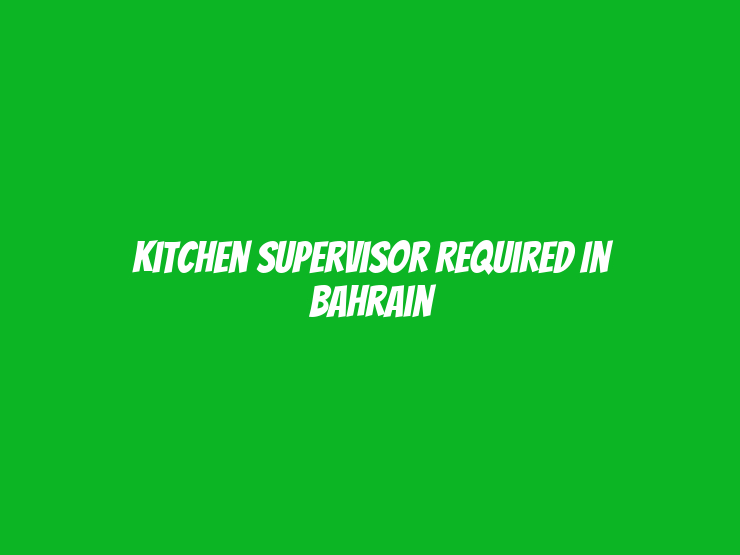A Kitchen Supervisor is responsible for overseeing the daily operations of a kitchen, ensuring that food is prepared and served to the highest standards of quality and hygiene. They manage kitchen staff, coordinate food preparation, and ensure compliance with health and safety regulations. Kitchen Supervisors typically work in various food service settings, such as restaurants, hotels, catering companies, and other establishments where food is served. Their role is crucial for maintaining the efficiency and smooth running of the kitchen, ensuring customer satisfaction through excellent food service.
Dua for Job Seeking: اللهم يسر ولا تعسر واكمل ولا تكل وبارك لي فيما قَدَّرت
| Salary | Market Competitive |
| Experience | 1 – 2 Years |
| Location | Bahrain |
| Qualification | Bachelor Degree |
| Posted | 23 October 2024 |
| Job Type | Full-Time |
| Posted by | Habeebi Recruiter |
| last date to apply | apply within 15 days |
Key Responsibilities of a Kitchen Supervisor
1. Supervising Kitchen Operations
The primary duty of a Kitchen Supervisor is to manage the day-to-day activities of the kitchen. This includes overseeing food preparation, cooking, and plating to ensure that dishes meet the establishment’s quality standards. The supervisor ensures that the kitchen runs efficiently, that orders are prepared on time, and that food portions and presentation are consistent. They act as the liaison between the kitchen staff and the front-of-house team, ensuring that communication flows smoothly and that any special requests from customers are handled effectively.
2. Staff Management and Training
Kitchen Supervisors are responsible for managing kitchen staff, including chefs, line cooks, and dishwashers. This involves scheduling shifts, assigning tasks, and ensuring that the team is working efficiently. They also play a key role in training new staff, making sure they understand kitchen protocols, hygiene standards, and food preparation techniques. By fostering a positive work environment, Kitchen Supervisors help maintain staff morale and minimize turnover, contributing to the overall success of the kitchen.
3. Inventory and Stock Control
A significant part of the Kitchen Supervisor’s role is managing inventory and ensuring that the kitchen is well-stocked with necessary ingredients and supplies. They monitor stock levels, place orders for fresh produce, meats, and other ingredients, and work with suppliers to ensure timely deliveries. By keeping a close eye on inventory, they can prevent shortages and reduce food waste, ensuring the kitchen runs efficiently and cost-effectively.
4. Ensuring Health and Safety Compliance
Maintaining high standards of hygiene and safety in the kitchen is a crucial responsibility for Kitchen Supervisors. They ensure that all kitchen staff follow health and safety regulations, including proper food handling, storage, and sanitation procedures. This includes conducting regular checks to ensure that kitchen equipment is clean and in good working order, and that food is stored at the correct temperatures. They also ensure that the kitchen complies with local health department regulations, minimizing the risk of foodborne illnesses and ensuring that the establishment passes health inspections.
5. Menu Planning and Development
In some establishments, Kitchen Supervisors contribute to menu planning and recipe development. They may work with the head chef or management team to create new dishes, refine existing recipes, and develop special menus for events or seasonal offerings. By considering factors like ingredient availability, food costs, and customer preferences, they help create a menu that is both appealing to customers and financially sustainable for the business.
6. Cost Control and Budget Management
Kitchen Supervisors are often responsible for managing kitchen budgets, ensuring that food costs stay within the set limits. This involves monitoring the cost of ingredients, minimizing food waste, and managing portion control. They may also assist in negotiating prices with suppliers to get the best deals, helping the business maximize its profitability. Efficient cost management is essential for maintaining the financial health of the kitchen and ensuring that the business remains competitive.
7. Quality Control and Customer Satisfaction
Ensuring that food is prepared to the highest standard is one of the key responsibilities of a Kitchen Supervisor. They oversee the preparation and presentation of meals, ensuring that each dish is cooked according to the restaurant’s specifications. This focus on quality control extends to taste, portion sizes, and presentation. By maintaining high standards, Kitchen Supervisors play a direct role in enhancing the customer experience, ensuring that guests leave satisfied and are likely to return.
Skills and Qualifications
To be successful as a Kitchen Supervisor, one must possess strong leadership and organizational skills. A deep understanding of cooking techniques, kitchen operations, and food safety regulations is essential. Experience in a kitchen environment, typically as a chef or line cook, is often required, along with the ability to manage a team in a high-pressure, fast-paced environment. Excellent communication skills, attention to detail, and the ability to multitask are also vital in this role.
In summary, Kitchen Supervisors are essential to the smooth operation of any kitchen. By managing staff, maintaining hygiene standards, controlling costs, and ensuring high-quality food service, they play a pivotal role in the success of the kitchen and the overall dining experience for customers.
How to apply:
Send your updated resume to our email or directly reach us at our phone:
Email: jnaroos@gmail.com
Phone: +38300838
Disclaimer:
- We list jobs submitted by employers. HabeebiRecruiter.com does not verify employers or guarantee job details.
- Be aware: legitimate jobs never require upfront payment
